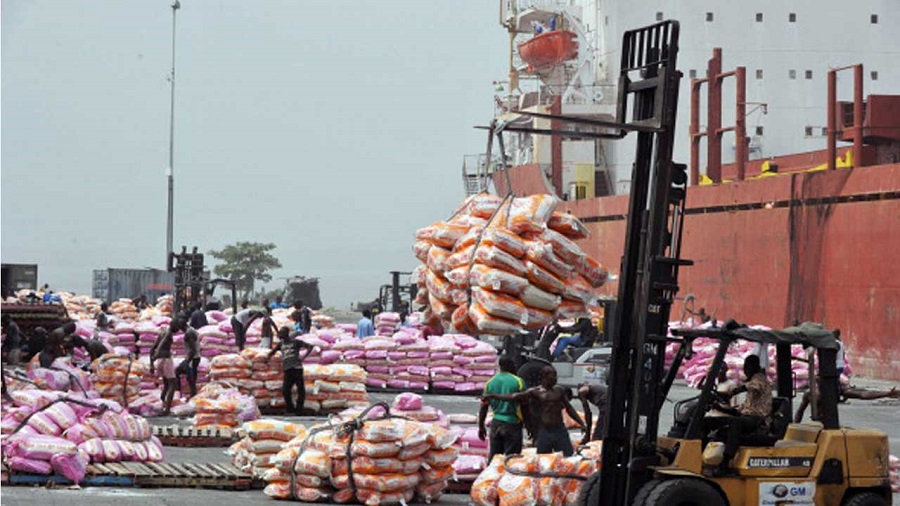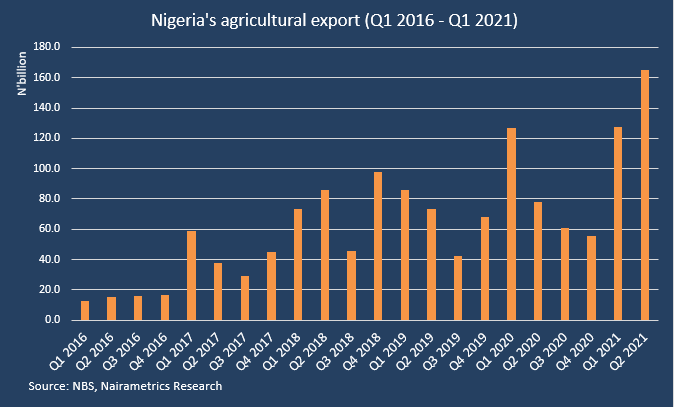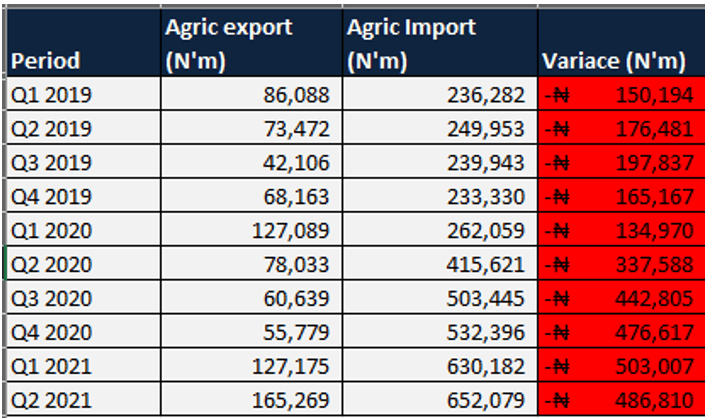Nigeria exported agro-food items worth N165.27 billion in the second quarter of 2021, representing a 112% increase compared to N78.03 billion recorded in the corresponding period of 2020. This is also the highest on record, according to data tracked from the National Bureau of Statistics (NBS).
The recent value also represents a 30% increase when compared to N127.18 billion worth of export recorded in the previous quarter (Q1 2021). Recall that Nairametrics had reported that Nigeria’s foreign trade increased by 89% year-on-year to N12.03 trillion in Q2 2021.

The report had also highlighted that Nigeria continued with a foreign trade deficit of N1.87 trillion having recorded an import value of N6.95 trillion as against an export value of N5.08 trillion.
Meanwhile, Nigeria’s agric imports also increased by 56.9% year-on-year in Q2 2021 to N652.08 billion, indicating a trade deficit of N486.8 billion, quite huge for a country blessed with vast land and an agricultural sector that employs a huge chunk of its labour force.

Nigeria continues to expand its ability to earn foreign returns from agricultural export, especially during a time when oil revenue is not as robust as it used to be, due to the OPEC production quota and oscillating crude oil prices.
However, the local production is still not enough for local consumption, hence the need to export food items from other countries, which in turn affects Nigeria’s balance of trade and by extension the exchange rate.
In a recent article by Nairametrics, the Chairman, Board of Directors of Sterling Bank Plc, Mr Asue Ighodalo while discussing at the 4th Agriculture Summit Africa (ASA) 2021 organised by the bank, stated that Nigeria’s agricultural productivity, which is currently growing by 1.3% is still insufficient to meet food and raw material demands.
A brief historic check, reveals that Nigeria has recorded a continuous agric foreign trade deficit in the past 5 and half years, with the highest being N503 billion recorded in Q1 2021 followed by the recent N486.8 billion recorded in Q2 2021.

Meanwhile, Nigeria’s GDP report shows that the agricultural sector has grown consistently positively in recent years, with the latest growth at 1.3% in Q2 2021. The sector is valued at N16.67 trillion in real terms, representing about 23.5% of the Nigerian economy.
It is imperative to track the items that fetch the country its foreign earnings as a result of its impact on the Nigerian exchange rate, hence these are the top agricultural products exported to other countries.
Top agric export
- Cocoa – N63.18 billion
- Cashew nuts – N42.94 billion
- Sesamum seeds – N21.64 billion
- Coconut – N13.02 billion
- Ginger – N3.75 billion
- Frozen sea foods – N3.46 billion
- Brasil nuts in shell – N3.28 billion
- Natural cocoa butter – N2.44 billion
- Sesame oil and its fraction – N1.29 billion
- Palm nuts and kernels – N1.08 billion
What this means
The growth in agric export means an increase in foreign earnings, which would help boost the country’s foreign reserve as well as relieve the pressure on the exchange rate. However, the continuous negative trade balance, indicates more pressure as Nigerians will continue to search for scarce forex in order to import items that would have been produced locally.

